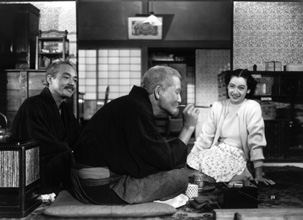Früher Sommer / Early Summer
Ozu Yasujiro
Japan 1951

|
Arsenal 13.02.2003, 20:00 |
Produktion: Shochiku (ofuna)
Weltvertrieb: Shochiku Co.
International Business Division 4-1-1
Tsukiji, Chuo-ku, Tokyo, 104-8422, Japan
Tel: (81-3) 5550 1623, Fax: 5550 1654
E-mail: ibd@shochiku.co.jp
www.shochiku.com/film
Buch: Noda Kogo, Ozu Yasujiro
Kamera: Atsuta Yuharu
Musik: Ito Senji
Darsteller: Hara Setsuko, Ryu Chishu,
Awashima Chikage, Miyake Kuniko
Format: 35mm, 1:1.37, s/w
Länge: 124 Minuten, 24 B/S.
Sprache: Japanisch
Noriko lives with her brother, Koichi, his wife, Fumiko, their two young sons, Isamu and Minoru, and her mother and father. Noriko is 28 years old and has never been married. She commutes daily to downtown Tokyo where she works in an office. Noriko has three main friends. One, Ayako, is unmarried like Noriko, while the other two, Mariko and Takako, are already married. When the four get together, there is always a friendly argument about whether it is better to be married or single. Mr. Satake, Noriko’s boss, has a friend, Manabe, who he feels would be a good match for Noriko. He gives her Manabe’s photographs and asks her to show them to her family. Noriko is hesitant about marrying an unknown man who also has the added disadvantage of being 40 years old. Noriko’s brother, Koichi, is a doctor and is eager to have his sister married. Noriko begins to accept the idea of being married… To attempt to describe the plot of an Ozu film never does it justice. They appear to be nothing more than a simple telling of everyday things that happen. But the ‘telling’ is done with such symmetry, artistry and sharpness that there is a deceptive refined simplicity to his films. By focusing on the same seemingly mundane themes like the desires for a happy family life, Ozu’s films are not steeped in drama which makes plots ‘move’. Beverley Bare Buehrer
Ozu Yasujiro (1903-1963). Ausbildung in einer Filmfirma. Filme seit 1927, zunächst Slapstick-Komödien und Gangsterballaden, danach viel bewunderte Gegenwartsfilme, die ihn zum Chronisten der japanischen Gesellschaft machten, u.a. Tokyo monogatari (1953), Soshun (1956), Kohayakawa-ke no aki (1961), Samma no aji (1962).